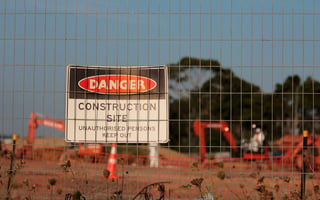Imagine a journalist turning around to you or your spokesperson mid-interview and asking ‘why are...
“Cold, calculated, evasive answers.”
“Sounding like a robot. Not answering questions.”
These are just some of the criticisms we saw on social media about one spokesperson’s performance during a TV interview last week
So, we thought we’d better take a look.
The interview in question featured Commander Jane Connors, the Met Police’s head of violence reduction, which oversees stop-and-search.
She appeared on Channel 4 News after new figures showed police had carried out the highest number of stop-and-searches in seven years, with the figure rising by more than 50 per cent in 12 months.
In the last financial year, there were over half a million stops and black people were nine times more likely to be stopped than white people. And those numbers grew higher during lockdown.
The interview, which begins at 5.34 in the below video, was proceeded by a personal report from Victor Olisa who used to lead stop-and-search in London and helped redraft the rules during a secondment to the Home Office.
Presenter Krishnan Guru-Murthy began by asking Commander Connors whether she accepted any of the criticisms that had been raised by Mr Olisa.
It proved to be a question that the police boss seemed reluctant to answer.
In fact, it took four attempts, as Commander Connors repeatedly tried to answer a different question.
Here’s how the exchange started:
Guru-Murthy: “Commander Connors, do you accept any of what Victor Olisa has just said about what you are getting wrong when it comes to stop and search?”
Commander Connors: “So, stop and search is a really important tactic. Our job is to keep people safe and that is why we do stop-and-search, particularly around weapons and violence. Those are the key reasons we do stop-and-search. We work closely with our communities to ensure that when we do stop-and-search the encounters we have are positive. And we work closely with the community to ensure we do have positive interactions with the people who are stopped and searched.”
As you can see, the question was completely ignored and you have to wonder quite how much trouble a member of the public would have got into if they had taken this evasive approach to questions from one of Commander Connors’ officers.
But things didn’t get any better.
After a second question was met with a similar response, Mr Guru-Murthy said: “I’m still not clear on what the answer is to my first question – do you accept any of his criticism or not?”
It took a fourth attempt before the police boss acknowledged that question and provided an answer, saying: “I don’t agree with the criticisms.”
If that was the case, why did it take so long to say it?
We’ve discussed this before in this media training blog, but you cannot evade those difficult questions, no matter how uncomfortable they may feel. Neither audiences nor journalists are willing to accept it. We increasingly see reporters calling out this approach in the interviews and those watching and listening are quick to give their thoughts on social media.
Commander Connors could have answered that question first time around by saying: “I don’t agree with the criticisms, but there is always room for improvement,” and then maybe gone on to identify some of those areas.
Whether or not you agree that is what the Met Police should be saying on the issue, it does answer the question that has been asked, rather than hiding behind what appear to be heavily-scripted ‘lines to take’.
When you start an interview in this sort of evasive, robotic manner, it becomes considerably harder to get it back on track and persuade the audience of your argument.
Some will have already switched off or zoned out, while others are likely to have already formed a negative opinion of you.
Answer the question Commander Jane Connors! @Channel4News
— Francesca (@francesca_valli) October 27, 2020
Cmdr Jane Connors appeared evasive and didn't seem engaged in the interview. It wasn't a good look.
— Michelle Rogers (@FZ3) October 27, 2020
#C4News Met Commander Jane Connors stalled when asked if she agreed with criticisms of how Met stop & search. Really doesn't create a good impression when KGM has to ask her 3 times to answer his question. #InstitutionalisedRacism still a Big Problem in the Met.
— Tinal #GiveThemPPE #KeepLeft #GTFTO ✋ (@owlhous) October 27, 2020
@krishgm superb interview with Comm Jane Connors, Met P and @sholmeslewis re Stop &Search. The Met need to put fwd a better person to answer these needed q's - scripted, formulaic responses are tone deaf and offensive to folk who wish to support the police.😡
— Liz (@mccann_liz) October 27, 2020
Commander jane connors wants to build trust with black community.... answering simple direct questions from @krishgm @Channel4News would be a good start #StopAndSearch #Police
— Sue Turbett (@Sue_Turb) October 27, 2020
Unfortunately for Commander Connors, the interview didn’t get any easier. The next question asked whether if there wasn’t “institutional racism behind these problems” was there “institutional denial”.
Not a particularly pleasant question to face and, to give Commander Connors credit, she was willing to meet this one with a straight answer.
Unfortunately, in doing so, she repeated the journalist’s negative language. She started her response by saying: “I don’t believe we are institutionally racist.”
This is another golden media training rule, but it is something we see happening all the time. Repeating the negative words and phrases in questions gives journalists a nice clip or quote, in the case of print interviews, of you using their language to tell your story.
You don’t need to repeat negative language in order to rebut it. In the example we have highlighted here, Commander Connors could have answered by simply saying “I don’t believe that to be the case” and then given some examples to support her view.
Commander Connors would have also benefitted from displaying more of a human side and more compassion. This would have helped to get the audience back on her side. Police speak like “working with the community” and “positive interactions” made her appear cold and detached. A more conversational approach, perhaps coupled with some personal anecdotes about people she had spoken to on the issue – “I was talking to someone just the other day who told me…” – would have helped people warm to her and her argument.
The other issue with this interview was that Commander Connors appeared alongside Sayce Holmes-Lewis, a community activist who has helped train Met police officers. He came to the interview positively, answered the questions he was asked clearly and offered strong opinions.
The contrast between their two performances served to highlight the flaws in Commander Connors’ approach to the interview.
Well done to #Sayce Holmes-Lewis for his measured response to the police officer #C4News
— JenniferFebruary (@Jenniferfebrua1) October 27, 2020
Terrble interview from @metpoliceuk Commander Jane Connors on @Channel4News refusing to answer @krishgm questions on #StopAndSearch Arrogant & lacking any emotion. Complete opposite to clear & articulate @sholmeslewis Not surprising it’s not working with such terrible leadership
— Mark Hexton ⚒⚒ (@Hammerhexy) October 27, 2020
Amid the social media criticism, there was one comment that irked me. It was a suggestion that the police boss’s performance was the result of media training.
Commander Jane Connors has definitely been on her media training course! #Channel4News
— Bitter Penguin (@Bitter_Penguin) October 27, 2020
Effective media training does not teach spokespeople to evade difficult questions and parrot answers to the questions they would have preferred to have been asked.
Instead, it gives spokespeople the tools to manage tough questions, answer them in a natural, human-sounding way and then try to control the conversation and get messages across.
Having worked as a communications manager in the police for many years, I know that senior officers do face difficult interviews on challenging subjects.
But this one could and should have been handled much better.
About to face the media? Get your media interview homework off to the best start by downloading your copy of our free media interview preparation eBook.
Media First are media and communications training specialists with over 35 years of experience. We have a team of trainers, each with decades of experience working as journalists, presenters, communications coaches and media trainers.
Subscribe here to be among the first to receive our blog.




